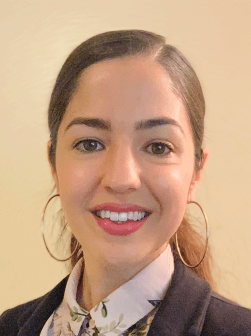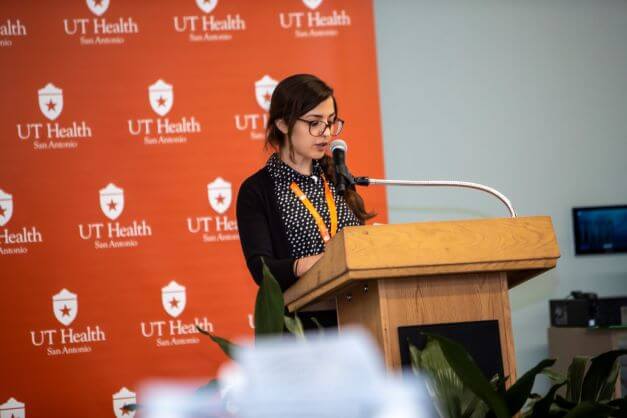Contact: Steven Lee, 210-450-3823, lees22@uthscsa.edu
SAN ANTONIO – Sara Masoud, MPH, a doctoral student in translational science at UT Health San Antonio and staff member at its School of Nursing, has received a nearly $250,000 Eugene Washington Engagement Award from the Patient-Centered Outcomes Research Institute. This grant will fund Masoud and her project team to collaborate with South Texas communities to identify research priorities and outcomes that are important to Latino stakeholders in dementia care.
PCORI is an independent nonprofit, nongovernmental organization based in Washington, D.C., working to better translate research to health care decisions.
With the grant, Masoud will conduct research and engagement activities guided by a council of key stakeholders including Latino family caregivers and individuals living with dementia who often are excluded from participating as partners in research. The project will focus on a region of South Texas from San Antonio to the southern Coastal Bend and Rio Grande Valley.
Grant partners include UsAgainstAlzheimer’s, an advocacy organization; the South Texas Area Health Education Center (AHEC); a UT Health San Antonio network of promotoras, Latino community members who receive specialized training to provide basic health information; and others. Mayra Mendoza, a Latina family caregiver and community advocate, will co-chair the steering council of stakeholders who will oversee and guide all activities of this project.
“I am grateful to have received this grant and ready for the inclusive community-driven engagement and research activities it will generate in South Texas,” Masoud said. “Even though Latinos are two times more likely to develop Alzheimer’s disease than non-Latino whites, they continue to be excluded from dementia and caregiving research.
“This project is important because it will facilitate opportunities for Latino families impacted by dementia and other key stakeholders in South Texas to guide research that directly impacts their communities,” she said.

Masoud, a senior community outreach coordinator with the Caring for the Caregiver program at the School of Nursing, long has been interested in community-engaged research focused on family caregivers and persons living with Alzheimer’s disease or related dementias. She earned the Outstanding Student Award from the UT Health San Antonio Institute for Integration of Medicine & Science (IIMS) for her collaborative efforts with community organizations, institutions and families throughout South Texas.
In addition to her research, she serves as a coordinator of a bilingual Memory Café and is lead of the Texas Memory Café Network, which provides welcoming places for those living with dementia and caregivers to socialize, enjoy cognitively engaging activities and exchange information. She also partners with the Outreach and Recruitment Engagement Core of the newly funded Alzheimer’s Disease Research Center, led by UT Health San Antonio’s Glenn Biggs Institute for Alzheimer’s and Neurodegenerative Diseases and The University of Texas Rio Grande Valley, for her outreach activities.
“Sara is passionate about employing authentic and meaningful community engagement to produce research that is relevant and translatable into practice,” said Carole White, PhD, RN, professor in the UT Health San Antonio School of Nursing, and Masoud’s mentor.
As leader of the nursing school’s Caring for the Caregiver Program, Dr. White has worked with Masoud on projects including a previous PCORI initiative to identify priorities for dementia care research through collaboration with stakeholders, and an IIMS-funded study of the impact of Memory Cafés.
“She has the necessary skills and experience to successfully complete this project,” Dr. White said, “and to continue research that is aimed at addressing the inequities in health and health care for Latino communities.”
Masoud hopes that her work will encourage and support other researchers to include diverse stakeholder groups, such as underrepresented and geographically marginalized communities of South Texas who are seldom heard.
The University of Texas Health Science Center at San Antonio, also referred to as UT Health San Antonio, is one of the country’s leading health sciences universities and is designated as a Hispanic-Serving Institution by the U.S. Department of Education. With missions of teaching, research, patient care and community engagement, its schools of medicine, nursing, dentistry, health professions and graduate biomedical sciences have graduated 39,700 alumni who are leading change, advancing their fields, and renewing hope for patients and their families throughout South Texas and the world. To learn about the many ways “We make lives better®,” visit http://www.uthscsa.edu.
The UT Health San Antonio School of Nursing, one of five schools of The University of Texas Health Science Center at San Antonio, offers five academic programs consisting of BSN, DNP and PhD degrees and specialty certificates. The school is dedicated to fostering diversity, equity and inclusion in the nursing profession as it educates future nurses who mirror the communities that they will serve. First-generation college students represent approximately one-third of enrollment. The school also operates a growing patient-care practice providing primary and acute care at its own clinic, Wellness 360, and at a variety of community partner sites. To learn more, go to https://www.uthscsa.edu/academics/nursing.
Stay connected with The University of Texas Health Science Center at San Antonio on Facebook, Twitter, LinkedIn, Instagram and YouTube.
To see how we are battling COVID-19, read inspiring stories on Impact.


